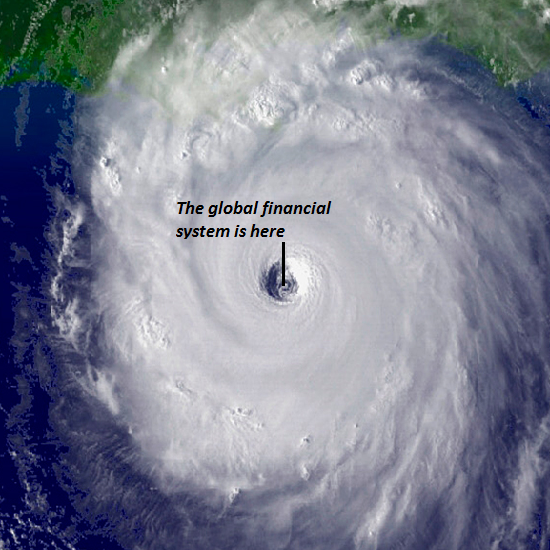The hope of 1968 that public
demonstrations can actually change the power structure has been lost.
1968 was a tumultuous year
globally and domestically. The Prague Spring in Czechoslovakia--a very mild form of
political and cultural liberalization within the Soviet bloc--was brutally
crushed by the military forces of the Soviet Union.
The general
strikes and student protests of May 1968 brought France to a standstill as
demands for social and political change called the entire status quo into
question.
On the
other side of the planet, the Cultural Revolution was remaking China's
still-youthful revolution, to the detriment of the political status quo, the
intelligentsia and the common people.
The U.S.was
convulsed with assassinations, civil unrest and mass demonstrations against the
war in Vietnam and the political status quo (the Democratic Party convention in
Chicago).
Ironically, much of the world
was benefiting from two decades of rising prosperity and the demise of
colonialism. When expectations exceed actual opportunities, discontent
is the result. When the power structure is deaf to the discontent, a cycle of
repression and disorder feed on each other.
Fifty years on, the ghosts of
1968 are still with us. With the advantage of hindsight, 1968 was the culmination
of the belief that it was still possible for the common people to change the
political and social order in a positive fashion-- to remake the status quo
power structure into something more humane, accessible, just and fair.
The Western status quo bent but
did not break. Nothing in the developed-world power structures actually
changed. The
status quo did break down in China, but the breakdown was not liberating; it
was a catastrophe of injustice and destruction without precedent.
A new winter of discontent is
chilling the air. Though the current state of affairs seems quite different
from that of 1968, the basic context is eerily similar: decades of economic
growth have ushered in widespread prosperity, but the benefits and power have
gone disproportionately to the few at the top of the wealth-power pyramid.
The status
quo power structures are deaf to the discontent of the common people, and
respond with blandishments (Universal Basic Income, etc.), propaganda and a
spectrum of repression.
In the context of 1968+50=2018,
Chris Hedge's incisive essay from 2010 bears re-reading. 2011: A Brave New Dystopia (truthdig):
The two greatest visions of a
future dystopia were George Orwell’s '1984' and Aldous Huxley's 'Brave New
World.' The debate, between those who watched our descent towards corporate
totalitarianism, was who was right. Would we be, as Orwell wrote, dominated by
a repressive surveillance and security state that used crude and violent forms
of control? Or would we be, as Huxley envisioned, entranced by entertainment
and spectacle, captivated by technology and seduced by profligate consumption
to embrace our own oppression? It turns out Orwell and Huxley were both right.
Huxley saw the first stage of our enslavement. Orwell saw the second.
We have been gradually
disempowered by a corporate state that, as Huxley foresaw, seduced and
manipulated us through sensual gratification, cheap mass-produced goods,
boundless credit, political theater and amusement. While we were entertained,
the regulations that once kept predatory corporate power in check were
dismantled, the laws that once protected us were rewritten and we were
impoverished. The state, crippled by massive deficits, endless war and corporate
malfeasance, is sliding toward bankruptcy. We are moving from a society where
we are skillfully manipulated by lies and illusions to one where we are overtly
controlled.
It's also worth
re-reading Mario Savio's extemporaneous speech to the Free
Speech Movement's sit-in on December 3, 1964, on the campus of the University
of California at Berkeley. Though the speech predates the Prague Spring and the
Paris general strike by four years, it embodies the core dynamic of those
social uprisings: the system itself is fundamentally flawed, and we are the raw
material and product that keep the system operating.
There is a time when the
operation of the machine becomes so odious, makes you so sick at heart, that
you can't take part; you can't even passively take part, and you've got to put
your bodies upon the gears and upon the wheels, upon the levers, upon all the
apparatus, and you've got to make it stop. And you've got to indicate to the
people who run it, to the people who own it, that unless you're free, the
machine will be prevented from working at all!
The hope of 1968 that public
demonstrations can actually change the power structure has been lost. The ghosts of
1968 inform us that there is no reforming the status quo power structure, there
are only simulacrum reforms that fulfill the PR requirements of being seen as
effecting reform. But people are losing faith in do-nothing policy tweaks;
those tossed aside as detritus by the winner-take-most status quo realize the
system is failing not just those on the margins but the entire citizenry. Those
who look at the stripmined seas, polluted air, depleted soils and aquifers know
the system is also failing the planet.

The system
needs us as raw material, as "product," as consumers of the output of
the machine. That we are consumed by the process--that awareness has faded into
the shadows inhabited by the ghosts of 1968.
My new book Money and Work Unchained is $9.95 for the Kindle ebook and $20 for the print edition.
My new book Money and Work Unchained is $9.95 for the Kindle ebook and $20 for the print edition.
Read the first section for free in PDF format.
If you found value in this content, please join me in seeking solutions by becoming a $1/month patron of my work via patreon.com.
If you found value in this content, please join me in seeking solutions by becoming a $1/month patron of my work via patreon.com.